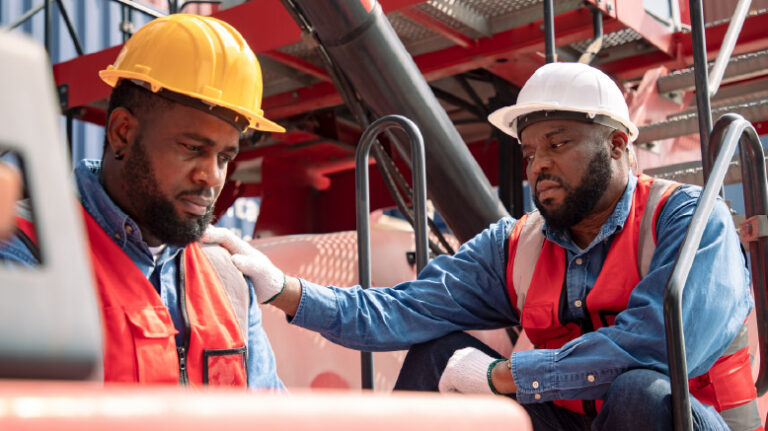— 5 min read
From Toolbox Talks to Tough Talks: Making Mental Health a Priority on the Construction Site


Last Updated Oct 9, 2025

Jym Bagtaz
Construction Administration Manager
Jym Bagtaz is the Construction Administration Manager at SPEC Process Engineering & Construction, Inc. in Tewksbury, MA. He has over 10 years of field experience and a strong background in both construction and office administration. He specializes in managing projects from pre-construction through closeout, coordinating contractors, tracking budgets, and ensuring compliance with safety and quality standards. In addition to his field expertise, Jym excels at office-based administrative functions, including contract management, document control, RFIs, submittals, scheduling, and stakeholder communication. His combined field and office experience allows him to bridge operational and administrative needs, delivering projects that are efficient, compliant, and completed to specification.

Marlissa Collier
34 articles
Marlissa Collier is a journalist whose work focuses on the intersections of business, technology, policy and culture. Her work has been featured in digital and print formats with publications such as the Dallas Weekly, XO Necole, NBCU Comcast, the Dallas Nomad, CNBC, Word in Black and Dallas Free Press. Marlissa holds an undergraduate degree in Construction Engineering from California State University, Long Beach and an MBA from Southern Methodist University’s Cox School of Business.
Last Updated Oct 9, 2025

My day would usually start the same way. Before the work began, I would gather with my crew and ask a simple question: “How are you doing today? Not just about the job—how are you really doing?”
At first, the answers were predictable: “I’m good.” “Ready to go.” But as I continued to ask consistently, something changed.
Over time, my guys start sharing more — one morning about a rough night’s sleep, another about worries about money and some would express concern over stress at home. Those morning moments weren’t just about checking boxes. They became the foundation of a culture where it was safe for humans to be, well, human.
That may not sound like much, but in the construction industry, notoriously focused on excuseless production, it’s a shift. Traditionally, the labor force was expected to keep personal struggles off the jobsite. You show strength and long suffering, push through and do your best to not let on that you’re struggling.
But a culture of struggling in silence can directly impact both production and profit. I am a construction manager living with bipolar disorder myself, which has given me a perspective that others on the jobsite might miss.
Table of contents
Why mental health matters in construction
On most jobsites, mental health isn’t just rarely discussed — it’s almost never discussed. The culture has long been built around a production-focused sequence: You show up, you do the job and you go home, then wash, rinse and repeat. But I’ve seen first-hand the cost of stoic silence — not just in people’s lives, but in safety, focus and retention.
My experience with mental health has taught me to notice the small cues in others — signs that someone is wrestling with something inside, even if their physical strength is completely intact and they never say out loud that they’re involved with a battle of the mind.
And herein lies the struggle. When someone falls off a ladder or cuts their hand, it’s easy to see and respond. But when someone is suffering from what’s happening in their head or their heart, it’s much harder. And in construction, we don’t often create spaces where it feels safe to say “I’m struggling.”
But for us, the stakes are higher than for most others. According to the CDC, the rate of suicide among male construction workers is four times higher than the general population. And nearly one in five suicides among working-age adults involve construction workers.
Therefore, ignoring mental health doesn’t just harm individuals. It creates ripple effects across a project: lower focus, more accidents, higher turnover and crews that don’t feel supported.
Go beyond OSHA regulations.
The Procore Safety Qualified program provides construction professionals with everything they need to know to create a culture of safety.

What I’ve seen work
I’ve been fortunate to work with leaders who make space for these conversations. Sometimes that looks like a wellness room in an office — no questions asked, just a place to reset. On jobsites, it can look like tailoring toolbox talks to address topics that go beyond physical site safety.
We can take a topic like impairment — alcohol or drugs — and ask, “What’s the root cause?” So often, it’s depression, anxiety or something deeper. Naming that out loud starts to normalize the conversation.
One of the best examples I’ve seen was with a crew member — we’ll call him Mark. He was having a bad week: showing up late, missing steps he’d done for years, irritable with everyone. His crew leader noticed and pulled him aside. He didn’t launch into a lecture. He just said, “Hey, you don’t seem like yourself lately. What’s going on?”
That five-minute conversation changed everything — not just for Mark, but for the entire crew. Over the next six months, I watched their culture shift. People felt more comfortable opening up. And that sense of safety spread, from one crew to others and even back into the office.
Leading differently
The biggest advice I’ve received — and now pass on to other leaders who want to become leaders of full and complex people — is this: Figure out how to normalize the conversation.
These talks don’t need to be an event or a special sit-down. In fact, if you learn to make mental health part of the daily rhythm rather than waiting on a crisis.
That can mean:
- Starting the day with a genuine check-in
- Posting hotline information in the job trailer
- Training crews to spot warning signs in each other
At the end of the day, it doesn’t have to be complicated. Sometimes it’s just about asking, “Are you okay? Do you need five minutes?”
That one question can make someone feel seen, their feelings valid — and that in itself can be life-changing or even saving.
The construction industry is built on grit: get it done, on time, under budget. But ignoring mental health has a cost — higher accident rates, lower retention and more substance abuse. Yes, caring costs time and money. But what’s the ROI on saving someone’s life? To me, that’s immeasurable.
My call to the construction industry
If you’re a leader on a jobsite, you don’t need to wait for a policy change or a corporate initiative. You can start right now:
- Ask your crew how they’re really doing — and mean it.
- Make mental health a normal part of training while ensuring tools and resources are available.
- Empower trusted leaders to check in and follow up.
- Lead with empathy, not just efficiency.
I’ve seen how even small shifts can transform a crew’s culture. When people feel safe enough to say, “I’m not okay today,” we build stronger teams, safer jobsites and healthier futures. For me, this isn’t abstract. It’s personal. And I believe the time for tough talks about mental health in construction is now.
Was this article helpful?
Thank you for your submission.
0%
0%
You voted that this article was . Was this a mistake? If so, change your vote
Scroll less, learn more about construction.
Subscribe to The Blueprint, Procore’s construction newsletter, to get content from industry experts delivered straight to your inbox.
By clicking this button, you agree to our Privacy Notice and Terms of Service.
Thank you!
You’re signed up to receive The Blueprint newsletter from Procore. You can unsubscribe at any time.
Categories:
Written by

Jym Bagtaz
Construction Administration Manager | SPEC Process Engineering & Construction, Inc.
Jym Bagtaz is the Construction Administration Manager at SPEC Process Engineering & Construction, Inc. in Tewksbury, MA. He has over 10 years of field experience and a strong background in both construction and office administration. He specializes in managing projects from pre-construction through closeout, coordinating contractors, tracking budgets, and ensuring compliance with safety and quality standards. In addition to his field expertise, Jym excels at office-based administrative functions, including contract management, document control, RFIs, submittals, scheduling, and stakeholder communication. His combined field and office experience allows him to bridge operational and administrative needs, delivering projects that are efficient, compliant, and completed to specification.
View profile
Marlissa Collier
34 articles
Marlissa Collier is a journalist whose work focuses on the intersections of business, technology, policy and culture. Her work has been featured in digital and print formats with publications such as the Dallas Weekly, XO Necole, NBCU Comcast, the Dallas Nomad, CNBC, Word in Black and Dallas Free Press. Marlissa holds an undergraduate degree in Construction Engineering from California State University, Long Beach and an MBA from Southern Methodist University’s Cox School of Business.
View profileExplore more helpful resources

The Case for Greater Ambulatory Care Investment
Healthcare owners and developers are grappling with significant challenges and costly requirements to achieve and maintain operational efficiency in the modern era. Rethinking how and where healthcare is delivered can...

Revolutionizing Owner-Side Project Management With a Proactive Approach
The risks facing owner-operators in renewable energy extend beyond the jobsite: They stack up over long development cycles, with complex permitting and utility sign-offs, plus handoffs from development to asset...

Preconstruction Precepts: 7 Keys to Winning Jobs and Delivering Profit
Preconstruction sets the stage for everything that follows. A fully justifiable, error-free estimate projects confidence, wins bids, and assures the profitability of the final project. However, estimates and budgets are,...

6 Tips to Turn Construction Culture Into Daily Practice
Every construction company has a culture. Whether it’s intentional or not. The difference lies in how that culture shows up on the job. In the first article of this series on...
Free Tools
Calculators
Use our calculators to estimate the cost of construction materials for your next project.
Templates
Find a template to help you with your construction project tasks.
Material Price Tracker
Get the latest U.S. retail prices and view historical trends for common building materials.
Glossary
Explore key terms and phrases used in the industry.
